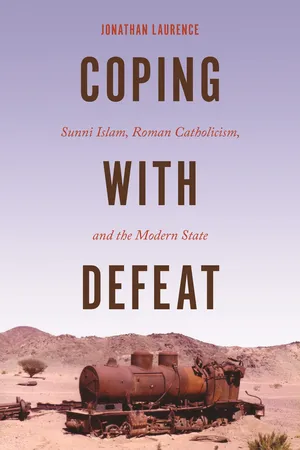
Coping with Defeat
Sunni Islam, Roman Catholicism, and the Modern State
- 552 pages
- English
- ePUB (mobile friendly)
- Available on iOS & Android
About This Book
The surprising similarities in the rise and fall of the Sunni Islamic and Roman Catholic empires in the face of the modern state Coping with Defeat presents a historical panorama of the Islamic and Catholic political-religious empires and exposes striking parallels in their relationship with the modern state. Drawing on interviews, site visits, and archival research in Turkey, North Africa, and Western Europe, Jonathan Laurence demonstrates how, over hundreds of years, both Sunni and Catholic authorities experienced three major shocks and displacements—religious reformation, the rise of the nation-state, and mass migration. As a result, Catholic institutions eventually accepted the state's political jurisdiction and embraced transnational spiritual leadership as their central mission. Laurence reveals an analogous process unfolding across the Sunni Muslim world in the twenty-first century.Identifying institutional patterns before and after political collapse, Laurence shows how centralized religious communities relinquish power at different rates and times. Whereas early Christianity and Islam were characterized by missionary expansion, religious institutions forged in the modern era are primarily defensive in nature. They respond to the simple but overlooked imperative to adapt to political defeat while fighting off ideological challenges to their spiritual authority. Among Laurence's findings is that the disestablishment of Islam—the doing away with Islamic affairs ministries in the Muslim world—would harm, not help with, reconciliation to the rule of law.Examining upheavals in geography, politics, and demography, Coping with Defeat considers how centralized religions make peace with the loss of prestige.
Frequently asked questions
Information
NOTES
Archives Consulted
Chapter 1. Sunni Islam, Roman Catholicism, and the Modern State
- 1. “État islamique: Abou Bakr al-Baghdadi appelle les musulmans à rejoindre ‘le califat,’ ” France Soir, May 15, 2014.
- 2. “Pope Calls on Europe to Reflect on Founders’ Hopes to Create a Better Future,” Deutsche Welle, November 25, 2014.
- 3. “The Sultan and the Pope,” New York Times, October 29, 1859, p. 4.
- 4. Barkey, “Political Legitimacy and Islam in the Ottoman Empire: Lessons Learned.”
- 5. “Remarks by President Obama to the Turkish Parliament,” The White House, Office of the Press Secretary, April 6, 2009.
- 6. Haddad, Le Reformisme musulman.
- 7. Norton, On the Muslim Question.
- 8. Shaye I. D. Cohen, “The Path to Victory,” from “Legitimation under Constantine,” scholarly commentary accompanying Jesus to Christ, broadcast by PBS Frontline, April 6, 1998.
- 9. Driessen, “Religious Democracy and Civilizational Politics,” p. 11.
- 10. Bill and Williams, Roman Catholics and Shi’i Muslims, pp. 97, 142.
- 11. Huntington, “Religion and the Third Wave,” p. 42.
- 12. Helmy, “The Contrasting Fates of Middle Eastern Politicized Islam and European Politicized Christianity,” p. 6.
- 13. Durkheim, The Elementary Forms of Religious Life.
- 14. Casanova, Public Religions in the Modern World.
- 15. Driessen, “Regime Type, Religion-State Arrangements, and Religious Markets in the Muslim World.”
- 16. Thomson, “Delegitimating State-Authorized Non-State Violence.”
- 17. Martin, The Statesman’s Year-Book (1878). See figure 4.1 (“Longest-Lasting Caliphates and Sultanates”).
- 18. Monastiri, “L’Isam de M. El-Qaddhafi.”
- 19. Brown, “Is Islam Easy to Understand or Not?,” p. 199; Esposito and Voll, Islam and Democracy.
- 20. An-Na’im, “Shariʾa and the Secular State in the Middle East and Europe,” p. 110.
- 21. Asad, “Secularism, Nation-State, Religio...
Table of contents
- Cover Page
- Title Page
- Copyright Page
- Dedication
- Epigraph
- Contents
- List of Illustrations
- List of Tables
- Abbreviations
- Acknowledgments
- Introduction: Coping with Defeat
- The First Defeat: The End of Empire
- The Second Defeat: The Nation-State Era
- The Third Defeat: The Era of Believers Without borders
- Conclusion: Embracing Spiritual Power
- Regime Timelines: 1500–Present
- Glossary
- Interviews
- Notes
- Bibliography
- Illustration Credits
- Index